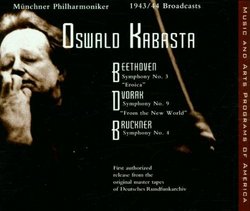| All Artists: Ludwig van Beethoven, Antonin Dvorak, Anton Bruckner, Oswald Kabasta, Munich Philharmonic Title: Oswald Kabasta - 1943/44 Broadcasts Members Wishing: 0 Total Copies: 0 Label: Music & Arts Program Original Release Date: 1/1/2006 Release Date: 1/1/2006 Genre: Classical Styles: Historical Periods, Classical (c.1770-1830), Symphonies Number of Discs: 2 SwapaCD Credits: 2 UPCs: 017685107221, 017685107221 |
Search - Ludwig van Beethoven, Antonin Dvorak, Anton Bruckner :: Oswald Kabasta - 1943/44 Broadcasts
 | Ludwig van Beethoven, Antonin Dvorak, Anton Bruckner Oswald Kabasta - 1943/44 Broadcasts Genre: Classical Oswald Kabasta was a contemporary of such Austro-Germanic conductors as Herbert von Karajan, Karl Böhm, Hans Rosbaud, and Eugen Jochum--all of whom are better remembered. Kabasta died in 1946, before the advent of the... more » |
Larger Image |
CD Details
Synopsis
Amazon.com
Oswald Kabasta was a contemporary of such Austro-Germanic conductors as Herbert von Karajan, Karl Böhm, Hans Rosbaud, and Eugen Jochum--all of whom are better remembered. Kabasta died in 1946, before the advent of the LP, while most of the others were still active in the studio after the advent of digital recording. But Kabasta's current obscurity can be more properly attributed to the tragedy of National Socialism. Kabasta was no more an ardent Nazi than was Böhm, who also signed off his correspondence with "Heil Hitler!" and who even more shamelessly flattered the Führer. But Böhm's conducting during the Nazi era was largely confined to Dresden and Vienna, relatively far from the Third Reich's corridors of power. Kabasta's problem was that he spent those years in Munich, the birthplace of the Nazi movement and the showplace for Hitler's grandiose schemes for the arts. Kabasta's Munich Philharmonic even called itself "The Orchestra of the Capital of the Political Movement." Kabasta thus had a more prominent profile as a Nazi than almost any other conductor had. Former party members, such as Karajan, were permitted to resume their careers after the war. But when the Allied occupation forces forbade Kabasta's return to the podium, the conductor committed suicide. Kabasta's recorded legacy is small, but this Music and Arts two-CD set of broadcasts demonstrates its distinction. He resembles contemporaries such as Jochum and Böhm less closely than older predecessors such as Furtwängler and Mengelberg. His conducting is characterized by spontaneity and by a fondness for fast and flexible tempos. Kabasta's Bruckner Fourth features a thrilling, horn-dominated finale that challenges comparison with Furtwängler's famous Deutsche Grammophon version. His noble reading of Beethoven's "Eroica" surges forward impulsively yet naturally. And while his performance of Dvorák's "New World" Symphony (once falsely attributed to Furtwängler) has more than a few sloppy moments, the excitement created by its reckless abandon is all but impossible to resist. --Stephen Wigler
